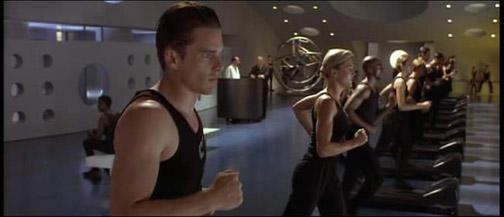Are You With Us?: Gattaca
By Ryan Mazie
October 25, 2011
Director Andrew Niccol enjoys envisioning the infinite impossibilities of the “near future.” In this week’s Justin Timberlake-Amanda Seyfried sci-fi chase flick In Time, Niccol pictures the future as a divide between the elegantly rich and the bleakly poor – filled with explosive shootouts and car chases. This same weekend 14 years ago, Niccol released Gattaca. The film (the title is devolved from the DNA nucleotide abbreviation) painted a different “near future” that was less bleak and much more grounded.
Gattaca takes place in a time where the genetic engineering of humans is common. This creates a society where class is determined by your genes (the genetically altered are known as “valids” while the naturally-born are called “invalids”). With the sampling of one’s blood becoming their calling card, Ethan Hawke stars (that is something you don’t hear anymore) as Vincent Freeman, an “invalid.” Dreaming of going into space, although his blood will only let him scrub the floors at Gattaca Corporations, the aerospace firm he works at; Vincent refuses to let his dream be ground.
Crossing paths with a perfect DNA specimen who is left a paraplegic (Jude Law) from a car accident, Vincent assumes his identity as Jerome Morrow. Painstakingly changing his appearance to fit the part (while they look alike, I never found them to be identical) and faking blood and urine samples to pass off the charade, Vincent’s dream of space travel is now a reality. However, after his department director gets murdered, an investigative team threatens Vincent’s identity theft.
Seeing a future where having a baby is essentially the same as choosing a car, Gattaca starts off interesting. The first 30 minutes are heavily narrated by Ethan Hawke, but the steady pacing in the strange yet similar world keeps things alive. The concept of the film is with us due to the future of genetic alteration being more real than ever. While we have already changed the DNA of the food and vegetables we eat and can clone animals, the new debate over “designer babies” makes Gattaca’s “near future” eerily close to the present. Unfortunately, I never found myself immersed into the movie beyond the first half hour.
The screenplay seems more of an outline than a fully developed idea. Niccol, who also scripted the screenplay, never fully explains anything. The valids are only differentiated by physical attributes. But what about intellectual capabilities? And if the appearance is most important, than why cast Ethan Hawke? I could not find Hawke relatable enough as an underdog. It is like watching attractive people being called ugly and unworthy, only because a marginally more attractive person is standing right next to them.
However, this isn’t to knock Hawke’s performance. With a steady narration and fierce determination behind his eyes, Hawke manages to provide jolts of adrenaline to the dialogue-heavy, refreshingly yet unfortunately action-less screenplay.
Focusing entirely on Hawke’s character, while fascinating, makes the rest of the film feel like filler. Niccol never properly fully realizes the rest of his characters in attempts to keep the attention on Vincent, even though I found the other storylines more enticing at points.
Uma Thurman (another name I haven’t heard in a mainstream movie in a while; someone please cast her already!) plays a valid and Vincent’s love interest although she never adds much to the story as expected to justify such a large amount of screen time. Thurman is powerful towards the end with a tearful monologue, but the impact is not full-force, for Niccol never properly introduces their relationship’s meaning from Vincent’s perspective.
The police investigation storyline is largely ignored, which is my biggest complaint. While Gattaca is more of a philosophical debate than a police procedure, the excitement involving a mysterious murderer could have livened up the pulse on this fairly bloodless film about… well, what’s in your blood.
For a debut film, I have to give Niccol credit on his stylistic approach. With lots of wide shots and a fairly tame color palette, the film is still beautiful to look at in an almost otherworldly sense (it received a single Oscar nomination for Art Direction-Set Decoration).
Debuting at the Toronto Film Festival to largely positive reviews (the film ranks at a high 82% on Rottentomatoes.com), Gattaca opened with a thud at the box office. Dropped into 1279 theaters (not a great sign of confidence), Gattaca ascended to fifth place with $4.3 million ($7.2 million adjusted) and quickly faded away with a $12.5 million total (about $21 million today) against a $36 million budget. Uma Thurman was really the only established star at the time of the release.
Niccol’s next film, S1m0ne, was an even bigger flop, raking in just under $10 million. Niccol’s third film, Lord of War, a personal favorite of mine, is his highest grossing at a still weak $25 million (half the budget). However, credited with writing the successful The Truman Show and the Spielberg semi-hit The Terminal, I guess Niccol still has enough box office clout to continue making expensive films while keeping his artistic integrity.
Ethan Hawke carries Gattaca with assists by Thurman and Law, although Niccol’s screenplay doesn’t do them many favors. Directed with a visual flair and a rare simplicity that is not often seen in sci-fi films, there is a certain honesty to Gattaca that makes it appealing, albeit too dull in a case of being too serious for its own good.
Not as perfect as its genetic code, Gattaca is thought provoking, but not thought prodding.
Verdict: With us
6 out of 10
|
|
|
|




